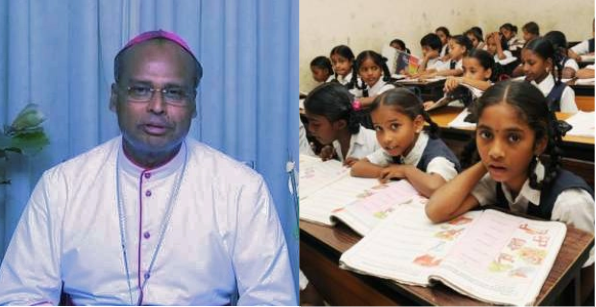Tamil Nadu Catholic Education Association (TANCEAN) slammed the National Education Policy over the saffronisation of education. The Christian association also garnered the support of Dravida Munnetra Kazhagam and many Non-governmental Organizations. TANCEAN asked students and teachers in Catholic Education to oppose NEP and write against it on social media.
“It is painful that the NEP is being implemented,” said Arch bishop of Madras and Mylapore George Antonysamy, asking Catholic educational institutions. He also condemned the inclusion of Yoga as a compulsory activity for schools and deplored the reference to Vedic studies in NEP.
The Christian educational institutions, which are plenty in the country, discriminate on the basis of religion and not allow people from other religious groups to be included in the administrative unit. The constitution of Christian run schools and colleges has a provision that a permanent member of the board must be a Christian; no person of any other faith is allowed even if s/he is the constitutional head of state.
As per Article 30 of the constitution, the minority community (religious and linguistic) has the right to establish and administer educational institutions of their choice. This had led to the proliferation of Madrasas and Christian educational institutions, but the same right is not conferred upon the majority. The minority institutions reserve seats for the ‘minority community’, prohibit the members of ‘other faiths’ to enter in the governing council of these institutions and refrain them from exercising any authority.
In many cases, these institutions are funded by the government. But this is a direct violation of Article 14 of the Constitution (fundamental rights to equality before law).
It is well known that many Christian organizations run education and medical trusts, and being a minority institution, they do not pay taxes despite making a lot of money. These institutions keep reserved seats for people from their communities, and even top colleges such as St Stephens College (funded by Central Government) carry out this practice. Similarly, there are Madrasas and universities run by Muslims, and in their case, the government even provides funds to these institutions. Therefore, public money is being used for the welfare of a “particular” religious community.
Moreover, The Right to Education (RTE) Act mandates that non-minority, Hindu, schools to reserve 25 per cent of their total seats to children belonging to economically weaker sections and other disadvantaged groups for free. Both government-aided and privately run minority schools do not come under the ambit of the RTE act but all private non-minority ones do. Any school that fails to comply with the long list of these rules then can simply be closed down or be taken over officially by the state government.
The minority institutions like- AMU, JMI, St Stephen’s college, and many other such colleges and universities, have reserved 50 per cent seats for the members of the community which controls these colleges. Many of these colleges received more than 50 per cent of funding from central or state governments, but they have refused to implement government norms regarding the quota to SC/ST, OBC, and Economically Weaker Sections (EWS) of the society.
There are thousands of other colleges and universities like AMU, JMI, and Stephen’s, which are funded with public money but do not implement the norms of reservation as mandated by the government. In the famous T.M.A Pai Foundation v/s State Of Karnataka case, the court has ruled that the institutions, even if under private management or minority community, would have to implement the government norms, if they receive public funds.
Previously the government decided to review the exemption given to minority schools under RTE. The government has shown the spine to tread over this sensitive territory, as Article 30(1) and the issue of minority institutions’ autonomy has always been considered a holy cow, not to be ever brought under question.
With the government now studying whether at all the absence of reservations and RTE is proving beneficial to the students of such institutions (which it is definitely not), it is being expected that they would soon let a fundamental right prevail, and would scrap the exemption granted to these institutions. If so, the Modi government would break a big status-quo, only for the betterment of India’s children, especially the underprivileged, who could only dream of studying at missionary schools thus far.
In the last few years, the government has taken steps to end the exemptions given to Minority institutions–based on which they flourished and carried out their conversion activities–which did not go well with these minority-run schools and colleges. Given this, the minority-run educational institutions are running campaigns against the new National Education Policy.
